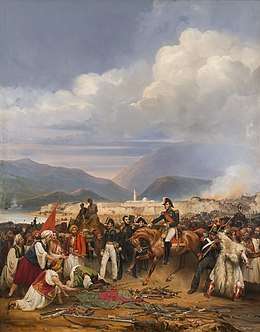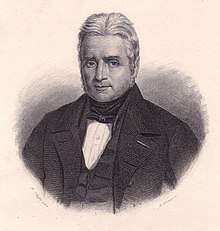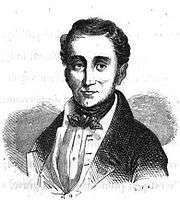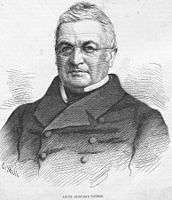Nicolas Joseph Maison
Nicolas Joseph Maison, 1er Marquis Maison (19 December 1771 – 13 February 1840) was a Marshal of France and Minister of War.[1]
Marquess Nicolas Joseph Maison | |
|---|---|
 Nicolas Joseph Maison, engraving by Aloys Senefelder | |
| Born | 19 December 1771 in Épinay-sur-Seine |
| Died | 13 February 1840 (aged 68) in Paris |
| Years of service | 1789-1836 |
| Rank | Marshal of France (1829) |
| Commands held | Morea expedition (1828) |
| Battles/wars | |
| Awards | Marquess Peer of France Name engraved under the Arc de Triomphe Grand-croix of the Order of Saint-Louis Grand-croix of the Legion of Honour Knight of the Military Order of Maximilian Joseph (Bavaria) Grand Cross of the Royal Order of the Redeemer (Greece) Knight Grand Cross of the Order of Charles III (Spain) Grand Cordon of the Order of Leopold (Belgium) |
| Other work | Minister of Foreign Affairs (1830) Minister of War (1835 –1836) |
Life
Revolutionary Wars and Napoleonic Wars
Nicolas-Joseph Maison was born in Épinay-sur-Seine, near Paris on 19 December 1771.
.jpg)
He enlisted in the French Revolutionary army in 1789 and on 1 August 1791, he was named captain in the 9th Battalion of Volunteer of Paris and served in the infantry in the early French Revolutionary Wars. He served as aide-de-camp to Minister of War Bernadotte in 1799.[1]
In 1805, he joined the I Corps of the Grande Armée assembled by emperor Napoleon I and participated in the Battle of Austerlitz. During the campaign of 1806 he served as a General de brigade in the corps of Marshal Bernadotte and took part in the chase of the Prussian army to Lübeck after their defeat at Jena. In 1808 he was sent to Spain where he served under Marshal Victor and was wounded at the capture of Madrid. In 1812 he joined Napoléon in the invasion of Russia. At some point in the invasion marshal Ney saved his life, a deed he would later repay by condemning Ney to death.[2] At the Beresina he was promoted to General de division and made a baron of the Empire.[1]
After the wounding of Marshal Oudinot, he took over command of the II Corps and led it during the retreat to the Weischel. He served in the campaign of 1813 and after Marshal Jacques MacDonald's defeat at the Battle of Katzbach was once again tasked with leading the retreat. After the Battle of Leipzig, where he was wounded, he was given the Grand Cross of the Légion d'honneur and was made a count of the empire.[3] In 1814, he was tasked with defending what is now Belgium and the port of Antwerp. With inadequate forces, he managed to hold his own against greatly superior Allied forces and defeated Johann von Thielmann's Saxons at the Battle of Courtrai.[1]
Bourbon restoration
After the abdication of the emperor, Maison rallied to Louis XVIII of France, who made him a Knight of St. Louis and appointed him Governor of Paris. During the Hundred Days, Maison stayed loyal to the Bourbons and joined them when they fled to Ghent. After the Second Restoration, he was made commandant of the 1st Military Division. He was put on the court martial appointed to judge Marshal Ney on a charge of treason for joining Napoléon but after he and his colleagues declared themselves incompetent he was demoted to command of the 8th Military Division in Marseilles. In 1817, Maison was created a marquis and a Peer of France by Louis XVIII.[1]
In 1828, he was given command of the French expeditionary corps in Morea (the Peloponnese peninsula in Greece).[1][4] This expedition consisted in a land intervention of the French Army in the Peloponnese at the time of the Greek War of Independence, with the aim of liberating the region from the Turkish-Egyptian occupation forces commanded by Ibrahim Pasha.[5] The military expedition was also accompanied by a scientific expedition mandated by the French Academy. After the soldiers took control of the principal strongholds held by the Turkish troops (Navarino, Modon, Coron and Patras), General Maison was created a Marshal of France by Charles X on 22 February 1829.[6][7][8][9] Although he returned to France after 8 months, the French kept a military presence in the area until 1833. He left Greece on 22 May 1829.[5]
 Meeting of General Maison and Ibrahim Pasha at Navarino in September 1828 (by Jean-Charles Langlois)
Meeting of General Maison and Ibrahim Pasha at Navarino in September 1828 (by Jean-Charles Langlois) Surrender of the Castle of Morea of Patras to General Nicolas Joseph Maison (by Jean-Charles Langlois)
Surrender of the Castle of Morea of Patras to General Nicolas Joseph Maison (by Jean-Charles Langlois)_-_MV_1168.jpg) Nicolas Joseph Maison, Marshal of France (by Léon Cogniet, 1835)
Nicolas Joseph Maison, Marshal of France (by Léon Cogniet, 1835)
July monarchy
In 1830 he joined the July Revolution and served in November 1830 as Minister of Foreign Affairs for a couple of weeks, before being sent to Vienna as ambassador. In 1833 he was made ambassador to Russia in St. Petersburg. Maison served as minister of war from 30 April 1835 to 19 September 1836 after which he retired from public life.[1]
Nicolas-Joseph Maison died in Paris on 13 February 1840. He is buried in the Père Lachaise Cemetery (division 5).[1]
Honors, military grades and decorations
- Name engraved under the Arc de Triomphe (Eastern pillar, Column 13 and 14)
- Ennoblement:



- Successive military grades:
- National Guard: Grenadier, Corporal, Sergeant major, then Captain.
- Army : Captain on 1 August 1792, Battalion commander (6 July 1796 provisionally, 16 August definitively), Adjutant general brigade chief on 3 July 1799, General of brigade on 10 February 1806, then Divisional general on 21 August 1812.
- Dignities:
- Marshal of France on 22 February 1829.
- Peer of France on 4 June 1817.
- French decorations:[3]





- Foreign decorations:




Political Offices
| Political offices | ||
|---|---|---|
| Preceded by Louis-Mathieu Molé |
Minister of Foreign Affairs 2 November 1830 – 17 November 1830 |
Succeeded by Horace François Bastien, baron Sébastiani |
| Preceded by Henri Gauthier, comte de Rigny |
Minister of War 30 April 1835 – 6 September 1836 |
Succeeded by Simon Bernard |
Annexes
Bibliography
- Mullié, Charles (1852). . (in French).
- "Nicolas Joseph Maison", in Adolphe Robert and Gaston Cougny, Dictionnaire des parlementaires français (1789-1891), Bourloton, Paris, 1889.
External links
- Resources related to his public life: Base Léonore ; Base Sycomore :
- "Notice no. LH/1698/41". Base Léonore, Ministry of Culture (France). (National Order of the Legion of Honour)
- "List of the peerage of Nicolas, Joseph Maison (1771 - 1840)". (French Senate)
- Defence Historical Service – Fort de Vincennes :
- File S.H.A.T. Reference : 6 Yd 34.
Linked articles
- Morea expedition
- List of members of the Morea expedition (1828-1833)
References
- "Nicolas Joseph Maison", in Adolphe Robert and Gaston Cougny, Dictionnaire des parlementaires français (1789-1891), Bourloton, Paris, 1889.
- Macdonell, A. G. (Archibald Gordon), 1895–1941. (1996). Napoleon and his marshals. London: Prion. ISBN 1853752223. OCLC 36661226.CS1 maint: multiple names: authors list (link)
- "Notice no. LH/1698/41". Base Léonore, Ministry of Culture (France). .
- Brewer, David (2001). The Greek War of Independence. The Struggle for Freedom from Ottoman Oppression and the Birth of the Modern Greek Nation. New York, USA: The Overlook Press. ISBN 978-1-58567-395-7. LCCN 2001036211.
- Nicolas-Joseph Maison (Lieutenant-general) : dépêches adressées au ministre de la Guerre Louis-Victor de Caux, vicomte de Blacquetot, October 1828, in Jacques Mangeart, Supplemental Chapter of the Souvenirs de la Morée: recueillis pendant le séjour des Français dans le Peloponèse, Igonette, Paris, 1830.
- Eugène Cavaignac, Lettres d'Eugène Cavaignac, Expédition de Morée (1828-1829) (Gallica - BnF), Revue des deux Mondes, 141, 1er mai 1897.
- Alexandre Duheaume, Souvenirs de la Morée, pour servir à l'histoire de l'expédition française en 1828-1829. (Gallica - BnF), Anselin, Paris, 1833.
- Jacques Mangeart, Souvenirs de la Morée: recueillis pendant le séjour des Français dans le Peloponèse (Google books), Igonette, Paris, 1830.
- Gaspard Roux, Histoire médicale de l'armée française en Morée, pendant la campagne de 1828 (Google books), Méquignon l'aîné père, Paris, 1829.
.svg.png)


